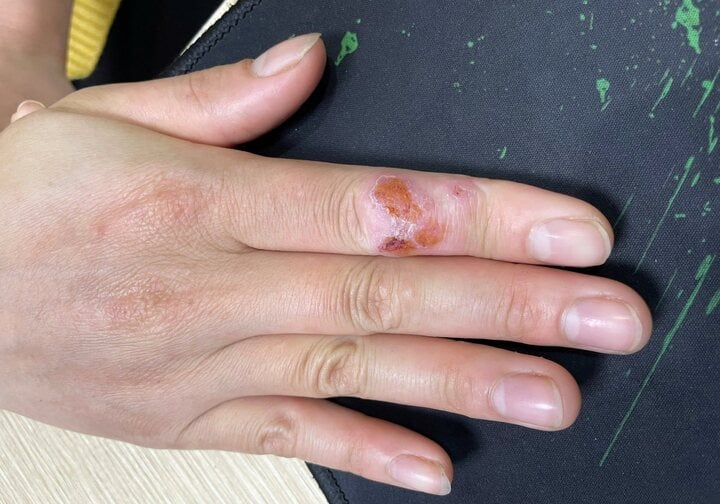Passionate about ornamental fish, a 60-year-old man in Hanoi spends hours every day tending to his fish tank. He does everything himself, from changing the water to cleaning the tank, but without protective gloves. A year ago, the second finger of his right hand became swollen and red. Despite visiting many doctors, his condition did not improve.
Recently, he consulted a dermatologist. After a thorough examination, medical history, and culture tests, he was diagnosed with granulomatous disease caused by Mycobacterium infection – a rare condition commonly seen in aquarium enthusiasts.
According to Dr. Nguyen Tien Thanh, a member of the Vietnam Dermatology Association, granulomas caused by Mycobacterium marinum infection are a rare disease caused by bacteria in contaminated water or fish tanks containing the pathogen. These bacteria enter through small scratches on the skin, causing granulomatous lesions.
“Granulomas typically begin as small, reddish-brown papules or nodules 1-4 cm in size, possibly with erosions, a hyperkeratotic and raised surface, and usually without ulceration or necrosis. Some have crusts on the granuloma base, which may secrete pus. Some cases have small satellite papules, which may form tunnels beneath the granulomas on the hands, elbows, knees, and feet. Patients often mistake them for benign lesions such as fungal infections, contact dermatitis, or warts,” said Dr. Thanh.

The second finger of the man's right hand was swollen and red due to a Mycobacterium infection. (Photo: BSCC)
If left untreated, granulomas caused by Mycobacterium infection can persist for many years, causing discomfort and affecting daily life.
According to experts, high-risk groups for granulomatous infections caused by Mycobacterium include aquarium enthusiasts who frequently clean tanks with bare hands, employees working in aquarium shops or aquatic environments, and fishermen.
To protect yourself from the risk of contracting pool granuloma disease, you should wear protective gloves when cleaning the aquarium or handling dirty water, maintain regular aquarium hygiene, change the water frequently, and clean the equipment in the tank.
You should also avoid touching dirty water with bare hands, especially if you have scratches or open wounds on your skin; protective gear should be worn.
If you notice any unusual, persistent skin lesions such as painless, red, itchy lumps that ooze fluid and do not heal, you should visit a dermatology specialist for timely examination and treatment.
Source: https://vtcnews.vn/mac-u-hat-tu-thu-choi-ca-canh-ar910502.html



![[Photo] The General Secretary presents the title of Hero of the People's Armed Forces to the Navy.](https://vphoto.vietnam.vn/thumb/1200x675/vietnam/resource/IMAGE/2026/02/28/1772251730336_vna-potal-tong-bi-thu-to-lam-du-va-trao-danh-hieu-anh-hung-llvt-nhan-dan-cho-quan-chung-hai-quan-8612073-jpg.webp)








































































































Comment (0)